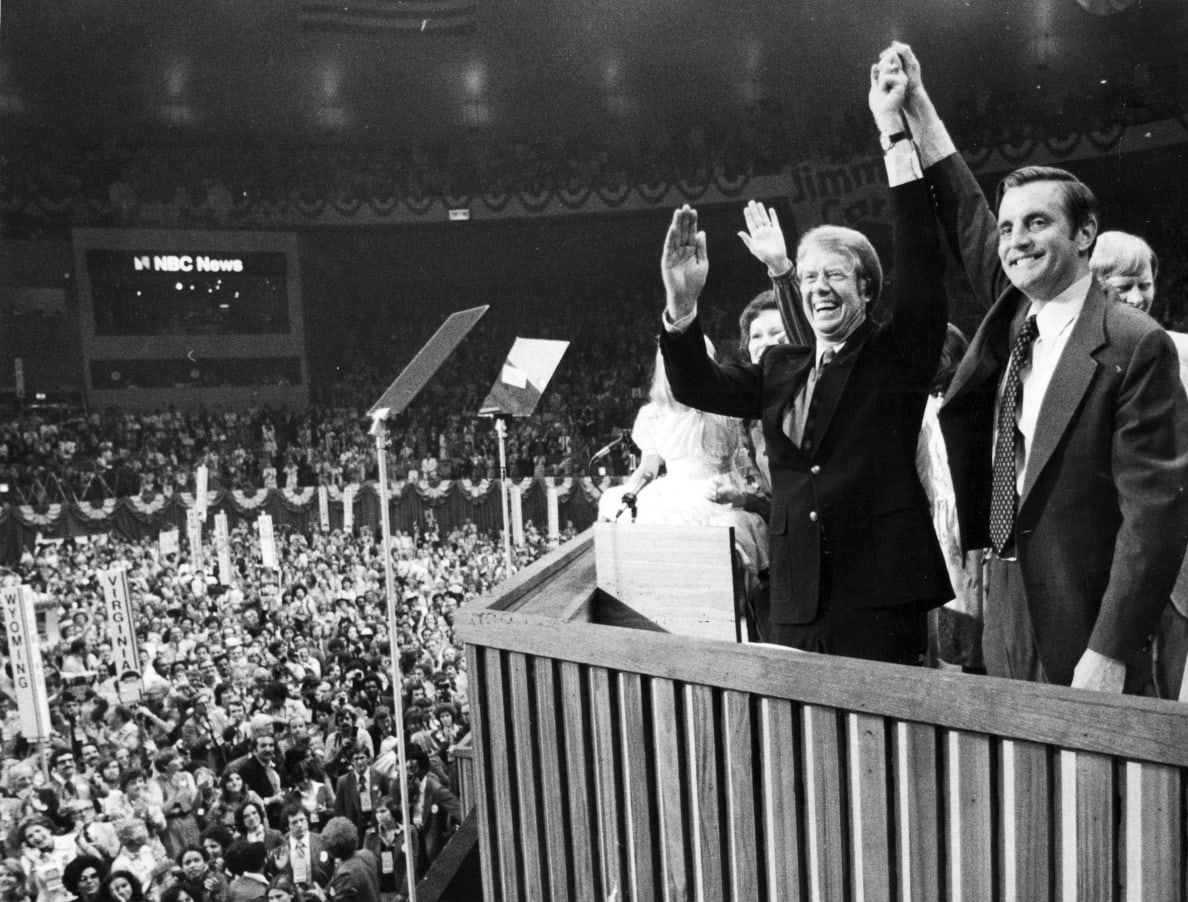What if Jimmy Carter Ran Again
Jimmy Carter won the presidency in 1976 because he understood the mood of the country, and because his bulletin of populist reform reached disaffected voters in a way that eluded other more than established politicians vying for the nomination in the aftermath of the Watergate scandal.
His signature lines, "I'll never tell a lie," and I'll lead, "a regime as good as its people," as well as his promise to curb the excesses of the CIA, which had come to light effectually the time of Watergate, outshone and outmaneuvered a field of 17 candidates that included former Vice President Hubert Humphrey, Senators Morris "Mo" Udall, Birch Bayh, Fred Harris and Henry "Scoop" Jackson, and a charismatic new governor in California named Jerry Brown. He went on to trounce incumbent GOP President Gerald Ford, but barely—he'd had a thirty-bespeak lead in the summer of 1976, and by Election Day, he lost all but one half of one point of information technology.
Carter'south political arc from insurgent outsider to humiliating loss, and now revered sometime president, is newly relevant to Democrats seeking to win the presidency in a morally fraught fourth dimension. He won because he was different, a Southern Democrat who wasn't a racist, and he spoke to voters' hopes and fears through the lens of populism. He ran against Washington, and so Washington ran against him. His presidency is a cautionary tale in what happens if Democrats are divided.
Carter was a New Southward governor, declaring in his 1971 inaugural accost in Georgia, "The time for racial discrimination is over." He had a portrait of Dr. Martin Luther King, Jr installed in Georgia's State Capitol. His party took discover, and Autonomous National Committee Chairman Bob Strauss named him chairman of the DNC's congressional and gubernatorial campaigns, "a huge boon" to Carter's national ambitions, says Les Francis, who showtime met Carter when he was a young aide working for California Rep. Norm Mineta, one of the leaders of the Democratic course of '74, elected after Watergate. Carter invited him to come hear his pitch at a $25 a head fundraiser at a nearby Sheraton hotel. "We had been briefed by (Democratic pollsters) Pat Caddell and Peter Hart on polling post-Nixon that showed voters wanted honesty, integrity and conviction in government restored. I realized Carter was striking all those notes. Perhaps he was at 1 percent at present, but he was on to something," Francis said.
Carter was a longshot, and the press mocked him for his Pollyanna hope about never telling a lie. But the voters listened. His slogan: "Send a president, non a bulletin." He ran as a conservative Democrat, carrying every Southern land except Virginia. He defeated segregationist Alabama Governor George Wallace in the 1976 Florida and North Carolina Autonomous primaries, ridding the party of Wallace's racist scourge. Carter won Iowa and New Hampshire, because more than liberal candidates split the liberal vote. Even so, the grit didn't really settle until May, simply when information technology did, Carter had the nomination.

Jimmy Carter and Walter Mondale heighten hands to an enthusiastic crowd after their acceptance speeches at the Democratic National Convention at Madison Square Garden in Manhattan on July 15,1976.
Joe Dombroski/Newsday via Getty
In the general election, he ran as a populist against a tax lawmaking that rewarded the rich and a government that had failed the people. "We were not pledging a new Great Club, we were running against Watergate," says Stu Eizenstat, Carter's top policy adviser, who recalled in an interview with The Daily Beast how Carter came into the Democratic Convention in New York in July 1976 with a 30-point atomic number 82 over President Gerald Ford "and lost all but one one-half of one pct" by Ballot Mean solar day in November.
Eizenstat says Carter lost his luster as an insurgent outsider when labor leaders, big-city mayors, and even some feminist groups endorsed him. Every bit he worked to get the various elements in the Autonomous Political party behind him, moderates saw him equally just another traditional Democrat, and he steadily lost ground in the polls. He would say, co-ordinate to Eizenstat, "The Democratic Party became an boundness around my neck."
The fault lines in his candidacy became apparent in the fall campaign, and if Ford had not pardoned Nixon, he about certainly would have carried the election. Carter won with such a narrow margin that when a New York Times reporter asked what legislative initiatives Carter would undertake, Eizenstat said that lacking a mandate, they would take to adjust their vision and get-go pocket-size.
Carter reamed him out for that. He thought big about the energy crisis facing the land, and the potential for peace in the Middle East. And right out of the box, he picked a fight with the Autonomous Congress over funding water projects, threatening to veto a public works bill if it contained whatsoever projects on his "hit listing." Carter was always progressive on the surround and civil rights, but he was a financial conservative. He couldn't abide what he saw equally wasteful and unnecessary regime spending.
He failed to realize the importance of these projects to individual lawmakers. He backed off his veto threat under pressure level from Democratic Speaker Tip O'Neill, merely a sour tone had been fix. And Carter looked weak to boot, having bowed to pressure. The side by side twelvemonth, 1978, he won ii big veto fights over spending, one on public works and water projects, the other on defense spending over an boosted nuclear carrier he didn't remember was necessary.
He won both fights with the help of Republican votes in the Democratic-controlled Congress. Democratic Bulk Leader Jim Wright said Carter's tactics made Lyndon Johnson expect similar a Lord's day School instructor. "We took that as a compliment," Francis recalls.
Resentment built on Capitol Hill amidst Democrats about the interloper who wasn't one of them, and when Carter resisted Senator Ted Kennedy'south demands for universal health intendance, essentially the Medicare for all that some Democrats propose today, the consequence was an open break inside the political party.
Carter proposed a piecemeal approach, arguing for upkeep constraints, which Kennedy rejected, deciding instead to claiming Carter in the primaries. "It was a cover, an excuse for Kennedy and the Kennedy forces to get into the race," says Francis, adding, "I understood that nostalgia for restoring Camelot. Jack Kennedy was my inspiration, Bobby was my hero."
Eizenstat details in his volume, Jimmy Carter: The White House Years, the many liberal initiatives Carter supported that weren't enough to hold off Kennedy. Though Carter had twice every bit many delegates when the Democratic Convention convened in Madison Square Garden in the summer of 1980, information technology was not a happy time.

Jimmy Carter waves before the crowd on the floor of the Autonomous Convention of 1980.
CORBIS/Corbis via Getty
"I'd never seen such anger since 1968," says Eizenstat. "Kennedy wanted regime-run Medicare, so Kennedy, instead of being a gracious loser, had to exist pushed onstage. And instead of a unity speech, he says, 'The dream will never die,' and he doesn't campaign for Carter, and we terminate up with Reagan.
"That split was merely fatal. Maybe nosotros would have lost anyway, but nosotros would accept won more than six states and the District of Columbia."
While the Democrats fought over whether Carter's proposed health care reform was expansive enough, Republican nominee Ronald Reagan took away Carter'due south white conservative base of operations and captured white evangelicals. Jerry Falwell, who launched the Moral Majority in 1979, said Carter was "not a real Baptist." The silent majority of disaffected whites initially identified by President Nixon and and so coalesced by Reagan is President Trump's coalition to this twenty-four hours.
Reagan took advantage of an economy with high involvement rates and gas shortages, plus he had a united political party while Carter was facing a challenge from the left that would show crippling.
Carter had won the Southward back from Nixon and the Republicans in 1976. Then he lost it, along with much of the country. The Democratic Party treated Carter like a pariah. In 1984, he wasn't given a primetime speaking slot at the convention, and some people didn't desire him in that location at all. By 1988, he had built the Carter Center and was responding to needs around the globe as he saw them, rebuilding his ain image in the process. The Democratic Convention was in Atlanta that twelvemonth, and Carter used the proximity to re-enter the political world on better terms.
Today, nigh 40 years after he left Washington as a failed president, Carter is at present hailed as one of his party'south most liberal voices. He voted for Bernie Sanders in the 2016 Georgia primary, although that might take had more to exercise with his animus against the Clintons. His chief of staff, the late Hamilton Jordan, referred to them equally the "Beginning Grifters."

Former President Jimmy Carter interviewed for "The Presidents' Gatekeepers" project at the Carter Center, Atlanta, Georgia, September 14, 2011.
David Hume Kennerly/Getty
Senators Amy Klobuchar and Cory Booker have made the trek to Georgia to seek Carter's counsel, and Mayor Pete Buttigieg is scheduled to nourish Carter's Dominicus Schoolhouse lesson at the Marantha Baptist Church building in Plains on May v.
President Trump chosen Carter last month to follow up on a letter he had sent him with advice about negotiating with China. Carter told his Dominicus School class that Trump is concerned about China "getting ahead of us." He said he agreed with Trump, pointing out that since 1979, when as president he normalized relations with China, "Nosotros have wasted, I think, $three trillion. China has not wasted a single penny on war, and that'southward why they're alee of united states in well-nigh every way."
He called the United states "the most warlike nation in the history of the globe," the kind of argument that aligns Carter with the progressive left. "He is seen as more liberal now than he was in '76 and when he was in the White House in the context of national security, foreign policy and national defense where he is more open up about his beliefs, skeptical about the apply of force, and has a very distinct signal of view well-nigh the Middle East and the relationship with the Israelis and Palestinians, which put him to the left of the strange policy establishment. That'due south the central," Les Francis told The Daily Creature.
Now his presidency is being reevaluated and his message reborn in a political moment reminiscent of the mail-Watergate distrust and disillusionment that got him to Washington four decades agone, and could well comport another Democrat with a similar bulletin to victory in 2020.
Source: https://www.thedailybeast.com/jimmy-carter-ran-against-washington-and-then-washington-ran-against-him
0 Response to "What if Jimmy Carter Ran Again"
Post a Comment